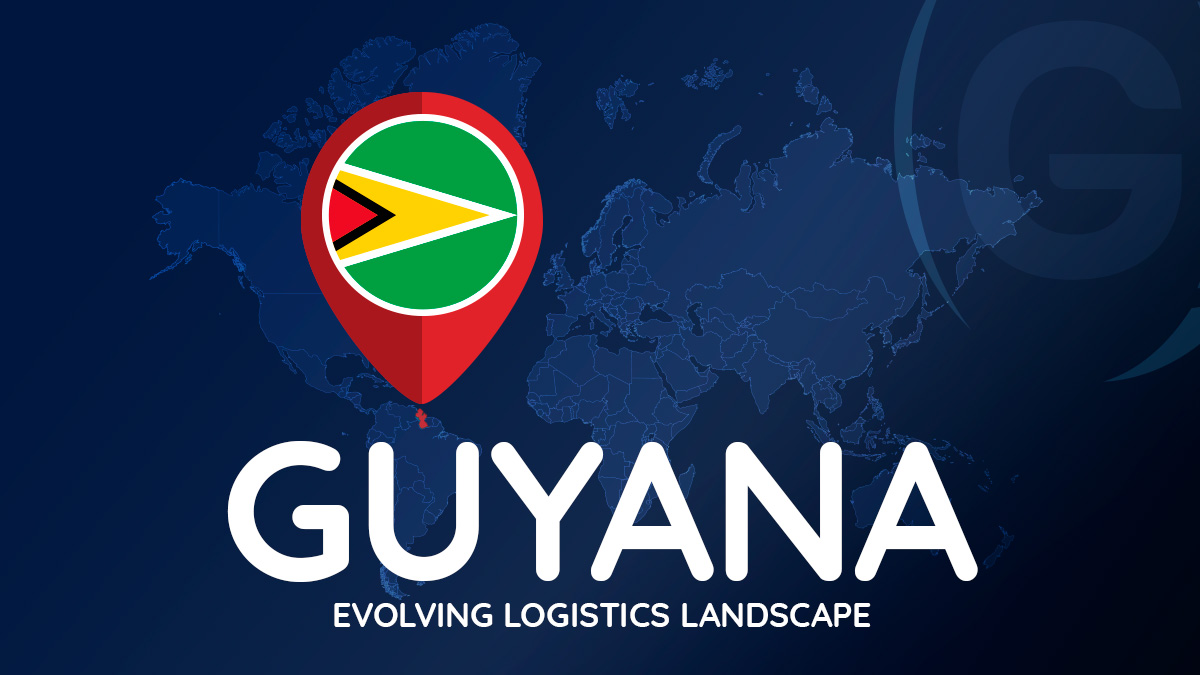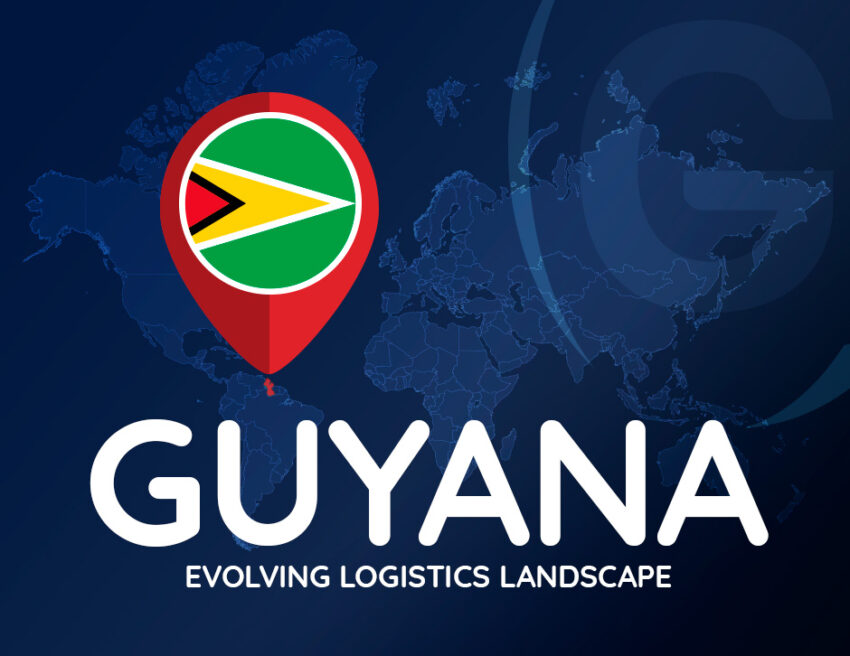The logistics industry in Guyana is undergoing a transformative phase, driven by the country’s rapid economic development and increasing integration into global trade. With rich natural resources, particularly in the oil and gas sector, Guyana is emerging as a crucial hub for commerce and industrial expansion. However, while the logistics sector has enormous growth potential, several challenges must be addressed by the logistics companies in Guyana to unlock its full capabilities.
In this blog, we will examine the key challenges and opportunities shaping the future of Guyana’s logistics industry and explore how independent freight forwarders can capitalize on this evolving landscape.

Challenges Facing Guyana’s Logistics Sector
1. Infrastructure Deficiencies
A major obstacle hindering the logistics industry’s growth in Guyana is its underdeveloped infrastructure. The country’s transport network struggles to keep pace with the demands of expanding trade.
- Road conditions: Many roads, particularly in remote areas, remain unpaved or in poor condition, leading to costly delays and inefficiencies, especially during the rainy season.
- Port limitations: Georgetown’s port plays a vital role in trade, but its limited capacity and outdated technology lead to congestion and slow cargo movement.
- Air freight constraints: A lack of frequent flights and limited air cargo routes make air transport both expensive and unreliable for businesses reliant on fast deliveries.
2. Regulatory and Bureaucratic Barriers
Guyana’s logistics industry faces regulatory complexities that can slow down operations and increase costs.
- Customs challenges: Lengthy clearance procedures and inconsistent enforcement of trade regulations create bottlenecks for logistics providers.
- Trade restrictions: Bureaucratic hurdles and policy uncertainty can make international trade cumbersome, limiting opportunities for growth.
3. Geographical and Environmental Obstacles
Guyana’s diverse landscape, while rich in natural resources, presents unique logistics challenges.
- Remote locations: Transporting goods to industries such as mining and oil exploration often requires costly alternatives like river transport or helicopters due to the lack of road infrastructure.
- Sustainability concerns: Logistics companies must balance economic growth with environmental regulations and efforts to reduce their carbon footprint.
Opportunities for Growth in Guyana’s Logistics Industry
1. Expansion of the Oil and Gas Sector
The discovery of vast offshore oil reserves has positioned Guyana as one of the world’s fastest-growing economies, creating significant opportunities for logistics providers.
- Energy sector support: Logistics companies that can efficiently handle the transport of oil exploration and production equipment stand to gain a competitive advantage.
- Infrastructure investments: The oil boom is driving development in ports, roads, and airports, benefiting not only the energy sector but the logistics industry as a whole.
2. Strengthening Trade Networks and International Collaboration
Guyana’s strategic location in northern South America provides an advantage for trade expansion.
- Regional trade agreements: As a CARICOM member, Guyana has access to a market of over 15 million people, offering logistics providers new business avenues.
- Foreign investments: Increased international interest in Guyana’s resources and industries creates further opportunities for logistics firms to grow and diversify.
3. Growth of E-commerce and Digital Trade
The rise of e-commerce in Guyana is opening new doors for logistics service providers.
- Last-mile delivery services: As online shopping expands, reliable last-mile logistics solutions will become increasingly vital.
- Warehousing and distribution: Logistics companies can capitalize on the need for better inventory management and streamlined distribution networks.
4. Adoption of Green Logistics Practices
Sustainability is becoming a priority as logistics firms seek to reduce their environmental impact.
- Eco-friendly logistics solutions: Companies that invest in green technologies and sustainable transport solutions can gain a competitive edge in the evolving market.
How Small and Mid-Sized Logistics Companies in Guyana Can Expand
As Guyana’s logistics sector grows, small and mid-sized logistics providers must position themselves strategically to remain competitive. Partnering with a global logistics network like Globalia Logistics Network offers a unique opportunity to enhance market reach, improve service capabilities, and strengthen international partnerships.
Expanding Market Reach Through Globalia’s Network
Independent freight forwarders often face limitations in resources, industry connections, and global exposure. By joining Globalia Logistics Network, logistics companies in Guyana gain access to a worldwide network of vetted, reliable freight forwarders, enabling them to handle international shipments more efficiently and expand their service offerings.
With a presence in over 204 cities worldwide, Globalia provides members with direct access to trusted partners across multiple regions, allowing logistics providers to compete with larger multinational firms without the need for significant capital investments in foreign offices.
Enhancing Credibility and Business Prospects
Membership in Globalia Logistics Network boosts the reputation of small and mid-sized freight forwarders. Globalia’s stringent selection process ensures that only high-quality, financially stable logistics firms become members. This certification enhances credibility and helps attract global clients seeking reliable logistics partners.
Leveraging Globalia’s Resources and Technological Support
Globalia offers a suite of innovative digital tools designed to help logistics companies streamline their operations and adapt to the evolving industry landscape. Members gain access to an exclusive freight rate management tool, enabling instant and efficient freight quotations, reducing operational burdens, and improving customer satisfaction.
Additionally, Globalia hosts an Annual Meeting, where members can establish face-to-face connections, explore business opportunities, and form long-term partnerships. These interactions create valuable business prospects, helping logistics companies expand their network and increase transaction volumes.
Financial Security and Cost-Saving Benefits
The first line of defence is that only the most solvent, reputable, and creditworthy agents are accepted as members. Furthermore, the network continues to monitor their performance, and promptly detect any signs of trouble, such as the late payment of an invoice issued by another member. Additionally, of the key advantages of joining Globalia is its optional payment protection plan, which safeguards members against financial risks, ensuring secure transactions with other network partners.
Conclusion
Guyana’s logistics industry stands at a crucial juncture, with a mix of challenges and opportunities shaping its future. While infrastructure limitations, regulatory complexities, and geographical obstacles pose significant hurdles, the booming oil and gas sector, trade expansion, and digital transformation present immense growth potential for logistics companies.
For small and mid-sized freight forwarders in Guyana, joining Globalia Logistics Network offers a strategic pathway to overcoming challenges, expanding their global reach, and enhancing service capabilities. With its extensive international network, technological advancements, financial protection, and cost-saving benefits, Globalia provides the essential tools for logistics companies in Guyana to thrive in an increasingly competitive and interconnected world.


